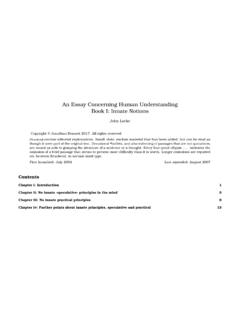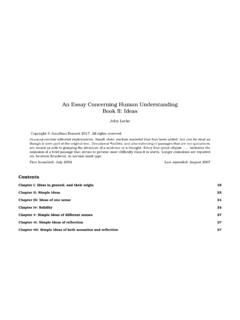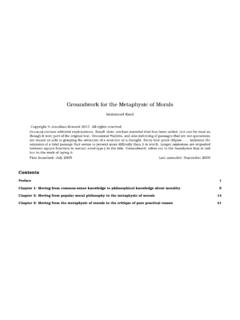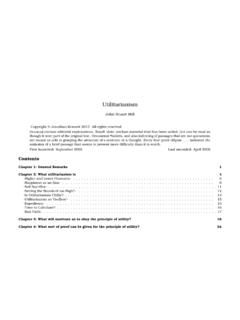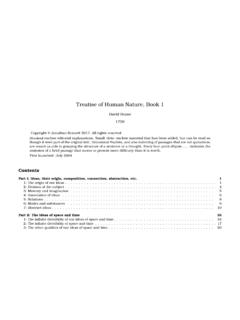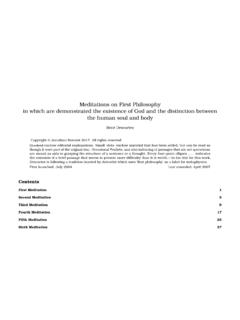Transcription of Dialogues Concerning Natural Religion - Early Modern Texts
1 Dialogues Concerning Natural ReligionDavid HumeCopyright Jonathan Bennett 2017. All rights reserved[Brackets]enclose editorial explanations. Small dots enclose material that has been added, but can be read asthough it were part of the original text. Occasional bullets, and also indenting of passages that are not quotations,are meant as aids to grasping the structure of a sentence or a thought. Every four-point ellipsis .. indicates theomission of a brief passage that seems to present more difficulty than it is worth. Longer omissions are reportedwith square brackets in normal-sized launched: July 2004 Last amended: November 2007 ContentsLetter from Pamphilus to Hermippus1 Part 12 Part 29 Part 316 Part 420 Part 524 Part 627 Part 730 Dialogues Concerning Natural ReligionDavid HumePart 834 Part 938 Part 1040 Part 1147 Part 1254 Dialogues Concerning Natural ReligionDavid HumePamphilus to HermippusLetter from Pamphilus to HermippusIt has been remarked that though the ancient philosophersmostly taught through Dialogues , the dialogue form hasn tbeen much used in recent times, and has seldom succeededwhen people have tried it.
2 There is a good reason for this .Philosophical enquirers these days are expected to produceprecise and orderly arguments; and someone aiming at thosewill naturally proceed with a methodical exposition in whichhe can, right at the outset, explain the point he wants toestablish, and then proceed without interruption to presenthis proofs of it. It hardly seems Natural to present asystemin conversation. And there is also another disadvantageof the dialogue form . By departing from the direct styleof composition the dialogue -writer hopes to give a freer airto his performance, and to avoid the appearance ofAuthorand Reader; but he risks running into something worse,conveying the image ofTeacher and Pupil. And if he avoidsthat by conducting the dispute in the Natural spirit of goodcompany, throwing in a variety of arguments, and preservinga proper balance among the speakers, he often spends somuch time setting things up, and moving from one line ofthought to another, that the reader will hardly think that theorder, brevity, and precision which have been lost are madeup for by all the graces of are some subjects, however, for which dialogue -writing is especially suitable, and preferable to the directand simple method of composition.
3 I shall describe two ofthem; apart from their suitability for the dialogue form theyare utterly unalike, though it will turn out that one big topicincludes both .Any point of doctrine that is so obvious that it can hardlybe questioned, but at the same time so important that itdeserves to be taught repeatedly, seems to require somesuch method of handling it. In a dialogue , the novelty of themanner of presentation may make up for the triteness of thesubject; and the liveliness of the conversation may reinforcethe teaching. Also, the variety of different angles from whichthe characters in the dialogue approach the subject mayappear neither tedious nor the other hand, any question of philosophy that isso obscure and uncertain that human reason can t reach asecure conclusion about it seems to lead us naturally intothe style of dialogue and conversation. Reasonable men maybe allowed to differ on a topic regarding which no-one canreasonably be confident. And opposing views, even withoutany decision as to which is right, provide an agreeable wayof passing the time; and if the subject is challenging andinteresting, the dialogue puts us (in a way) into the companyof the characters in it.
4 Thus a dialogue can unite the twogreatest and purest pleasures of human life, study and thecompany of , all those features are to be found in thesubject of Natural Religion . What truth is so obvious, socertain, as that there exists a God? People in the most igno-rant ages have believed this, and the most refined geniuseshave worked to produce new proofs and arguments for what truth is so important as this? It is the ground ofall our hopes, the surest foundation of morality, the firmestsupport of society, and the only principle that ought neverto be a moment absent from our thoughts and when we dig into this obvious and important truth, werun into obscure questions about the nature of that divinebeing, his attributes, his decrees, his plan of Concerning Natural ReligionDavid HumePart 1 Men have always disagreed about these matters, and humanreason hasn t definitely settled them. But these topics areso important that we can t restrain our restless enquiryinto them, even though our most accurate researches haveyielded nothing but doubt, uncertainty, and recently had a chance to observe this that is, thesuitability of Natural Religion as a theme for dialogue whenI was spending part of the summer season with Cleanthes,as I usually do, and was present at the conversations hehad with Philo and Demea the ones I recently sketched toyou.
5 My sketch made you so curious to know more (yousaid) that I can t forbear to give you a more detailed reporton their reasonings, and to display the various systems thatthey defended relating to this delicate subject of naturalreligion. The characters of the three men are remarkablydifferent, and this raised your expectations even higher. Youcontrasted the careful philosophical methods of Cleantheswith the casual scepticism of Philo, and contrasted each ofthose with the rigid inflexible orthodoxy of Demea. Beingyoung, I listened but didn t speak; and my intense youthfulinterest in the whole conversation imprinted on my memorythe whole chain and connection of their arguments. I hopeand think that my account of the conversation won t omit ormuddle any considerable part of 1 After I joined the group whom I found sitting in Cleanthes library,Demeapaid Cleanthes some compliments on thegreat care he took of my education, and on his unweariedperseverance and constancy in all his friendships.
6 Pam-philus s father, he said, was your intimate friend; the son isyour pupil, and we might think him to be your adopted sonif we judged by the trouble you take in bringing to him everyuseful branch of literature and science. I am sure that youare as prudent as you are hard-working; so I shall tell you amaxim that I have followed with regard to my own children,wanting to know how far it agrees with your upbringingof Pamphilus. The method I follow in the education of mychildren is based on the saying of an ancient:Students ofphilosophy ought first to learn logic, then ethics, next physics,last of all the nature of the this science ofnatural theology is the most profound and abstruse of any,he held, students of it need mature judgment, and it can tsafely be entrusted to a mind that isn t already enrichedwith all the other sciences.[In this work science means somethinglike systematic, disciplined, theoretical treatment . It covers more than science does today.]
7 ]Do you leave it as late as that,Philoasked, to teach yourchildren the principles of Religion ? Isn t there a risk thatthey will neglect or even outright reject those religious viewsof which they have heard so little during the whole of theireducation?Demeareplied: I postpone the study of Natural theologyas a science that is open to human reasoning and contro-versy, butonlyas a science. My chief concern with mychildren is to bring piety into their minds while they are2 Dialogues Concerning Natural ReligionDavid HumePart 1young. By continual teaching (and also by example, I hope), Iimprint deeply on their young minds a habitual reverence forall the principles of Religion . While they pass through everyother branch of knowledge, I comment on the uncertaintyof each branch, on the eternal controversies of men, on theobscurity of all philosophy, and on the strange, ridiculousconclusions that some of the greatest geniuses have derivedfrom the principles of mere human reason.
8 Having thustamed their mind to a proper submission and distrust oftheir own abilities, I no longer hesitate to open to them thegreatest mysteries of Religion ; and I see no risk that thepresumptuous arrogance of philosophy will lead them toreject the most established doctrines and precaution of bringing piety into your children sminds Early on, saidPhilo, is certainly very reasonable; itis indeed needed in this profane and irreligious age. Butwhat I admire most in your plan of education is your wayof getting advantage from the very principles of philosophyand learning which, by inspiring pride and self-sufficiency,have often throughout the centuries been found to be sodestructive to the principles of Religion . They are not so witheveryone, admittedly . Common folk with no experience ofscience and profound enquiry, when they see how learnedpeople are endlessly disputing, often have a thorough con-tempt for philosophy; and that makes them hold even morefirmly to the great points of theology that they have beentaught.
9 People who entera little wayinto study and enquiry think they find evidence to support new and extraordinarydoctrines; come to think that nothing is too difficult forhuman reason; and presumptuously break through allfences and profane the holiest places in the temple. Ourbest protection against such arrogance in religious matters isignorance; but after we have abandonedthatwe stillhave as I hope Cleanthes will agree one way remaining tous to prevent this profane liberty of laying down the law inreligious matters . What we should do is to adopt improvedand cultivated versions of Demea s principles Concerning ourproneness to error and confusion . Let us become thoroughlyaware of the weakness, blindness, and narrowness of humanreason, paying proper attention to its uncertainty and itsendless contradictions, even in ordinary everyday subjects;let the errors and deceits of our senses be kept in mind;the insuperable difficulties surrounding the basic principlesof every intellectual system; the contradictions involved inthe very ideas of matter, cause and effect, extension, space,time, motion in short, all kinds of ideas ofquantityof allkinds, though quantity is the topic of mathematics , theonly science that has any claim to certainty or are displayed in their full light, as theyare by some philosophers and almost all religious writers,who can remain confident enough of his frailreasonto giveheed to anything it tells him on topics that are so sublime,so abstruse, and so remote from common life and experience as the existence and nature of God ?
10 When we realizethat really familiar things like the holding-together of theparts of a stone, or even the structure of it that makes itan extended thing are so inexplicable and involve suchcontradictions, how confidently can we reach conclusionsabout the origin of worlds, or trace their history from eternityto eternity?As Philo spoke, I noticed that both Demea and Cleantheswere smiling. Demea s smile seemed to express total satisfac-tion with what Philo was saying; but, in Cleanthes featuresI discerned an air of knowing amusement, as though he sawin Philo s reasonings some kind of teasing or propose then, Philo, saidCleanthes, to erect reli-gious faith on a basis of philosophical scepticism; and youthink that if certainty is expelled from every other subject of3 Dialogues Concerning Natural ReligionDavid HumePart 1enquiry it will retreat into these theological doctrines, whereit will be stronger and more authoritative than ever. Whetheryour scepticism is as absolute and sincere as you claim issomething we shall learn later on, when we end this littlemeeting: we ll see then whether you leave the room throughthe door or the window; and whether you really doubt thatyour body has gravity and can be injured by its fall which iswhat people in general think on the basis of their fallacioussenses and more fallacious experience.


